In Quiet: The Power of Introverts in a World That Can’t Stop Talking, Susan Cain writes about Rosa Parks:
“I had always imagined Rosa Parks as a stately woman with a bold temperament, someone who could easily stand up to a busload of glowering passengers. But when she died in 2005 at the age of 92, the flood of obituaries recalled her as soft-spoken, sweet, and small in stature. They said she was ‘timid and shy’ but had ‘the courage of a lion.’ They were full of phrases like ‘radical humility’ and ‘quiet fortitude.’ ”
Rosa Parks’ legacy is weaved into the fabric of American history. Her revolutionary choice to not give her seat up for a white man was, at the time, cataclysmic. The boldness of the action and grandeur of its consequence could fool anyone into assuming Rosa Parks was a bold, seemingly extroverted person. That wasn’t the case. Her ‘timid and shy’ persona is not one you’d typically assign to someone looking to radically alter the way racial equality is perceived and addressed in America and around the world, but Rosa Parks was unassuming in her bravery, her introversion providing fertile ground for the ‘courage of a lion’ to feed, grow, and roar.
An introvert looks inward, not relying on others for energy and self-betterment. They rest and recuperate best when alone. Identifying as an introvert can help provide anyone with a sense of ownership over their identity and pushes the label toward being a pillar of power and, of course, self-improvement – as this article will look at.
For additional strategies that accelerate personal growth, introverts and extroverts alike can benefit from purposeful self-development techniques.
Before we get into it, there’s one thing to remember. Introverts and extroverts, while often compared (as seen in this article already), are not to be pitted against one another. One is not better than the other. Instead, this article will look at the power of identifying as an introvert and the potential course-correcting effect it can have on your self-improvement journey.
The power of reflection
Let’s bring it back to Rosa Parks for a second. Her ‘courage of a lion’ didn’t appear out of nowhere. It grew throughout her life, rearing its maned head during that historic moment on the bus. Of course, we cannot attribute all of this to her more introverted demeanour. Before she died, she said the lynching of 14-year-old Emmett Till and the justice system’s complete failure to hold his killers accountable drove her to act. It could, however, be argued that her more introverted nature pushed her to learn more about herself and know when enough is enough. It seems like a small thing now, but her actions pushed forward a movement spearheaded by the great Martin Luther King Jr. She has this to say on the incident:
“I was not tired physically, or no more tired than I usually was at the end of a working day. I was not old, although some people have an image of me as being old then. I was 42. No, the only tired I was, was tired of giving in.”
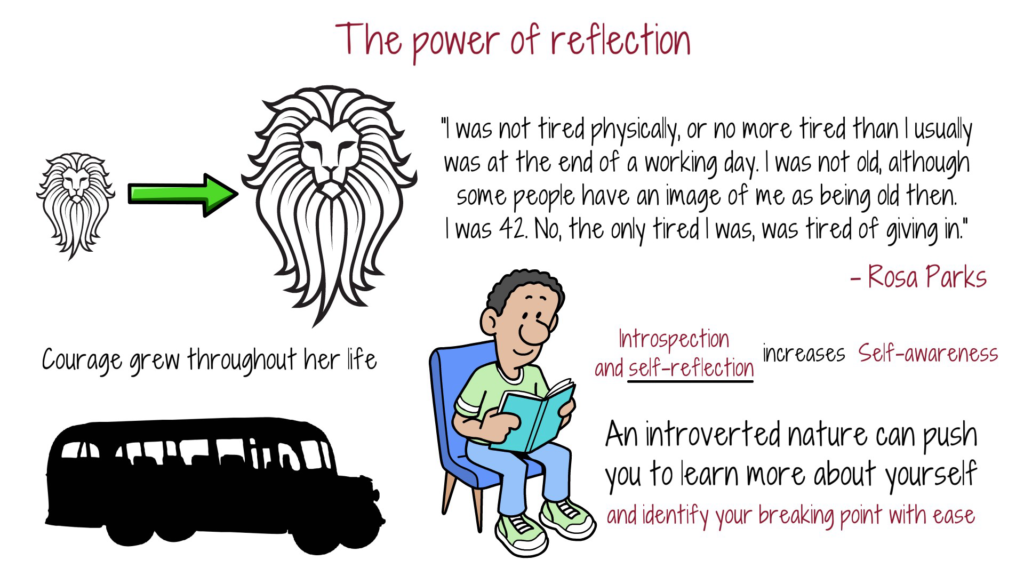
When you operate from a more inward-based perspective, you can identify your breaking point with ease. While Rosa Parks is an extraordinary example, introverts’ natural inclination for introspection and self-reflection can increase self-awareness, a core element of personal growth. After all, understanding emotions means you can understand yourself. Many essential life skills, such as effective self-reflection, are things we should have learned in school but never did.
Deep listening and empathy
Self-improvement does exactly what it says on the tin. You literally improve yourself. However, a massive part of improving yourself comes with learning to listen attentively and empathise with others as much as you can. This helps shape a nurturing worldview and seeps into how you treat yourself.
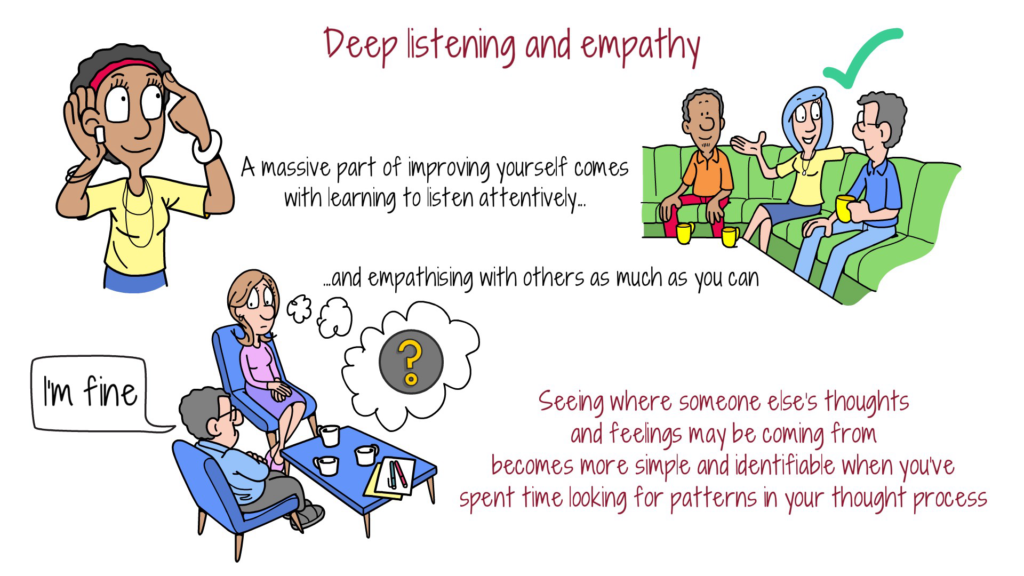
While an introvert typically enjoys their own company more than anyone else’s, that doesn’t mean they’re bad at listening and empathising with others. It can be the exact opposite. When you spend more time with your thoughts, as introverts typically do, then it becomes easier to see where someone else’s thoughts and feelings may be coming from – that “I’m fine” may not necessarily mean everything is fine, or even something as simple as providing good quality advice. These things become more simple and identifiable when you’ve spent time looking for patterns in your thought process.

Moreover, introverts don’t like being the centre of attention. Instead of ensuring everyone hears their voice, people who lean more towards introversion prefer to keep themselves to themselves, placing higher importance on listening.
Listening, after all, is one of the biggest advantages anyone can have on their self-improvement journey. If you can listen effectively and show empathy to those around you, you’ll naturally build a community of caring people.
The strength of solitude
Of course, you may not feel that introversion completely defines you. If you’re a more outgoing, extroverted person, spending more time alone is a simple yet cunning tool for mastering self-improvement. There are many benefits to spending more time in solitude, such as:
- Increases empathy
- Boosts productivity levels
- Inspires more regular creativity
- Builds mental resilience
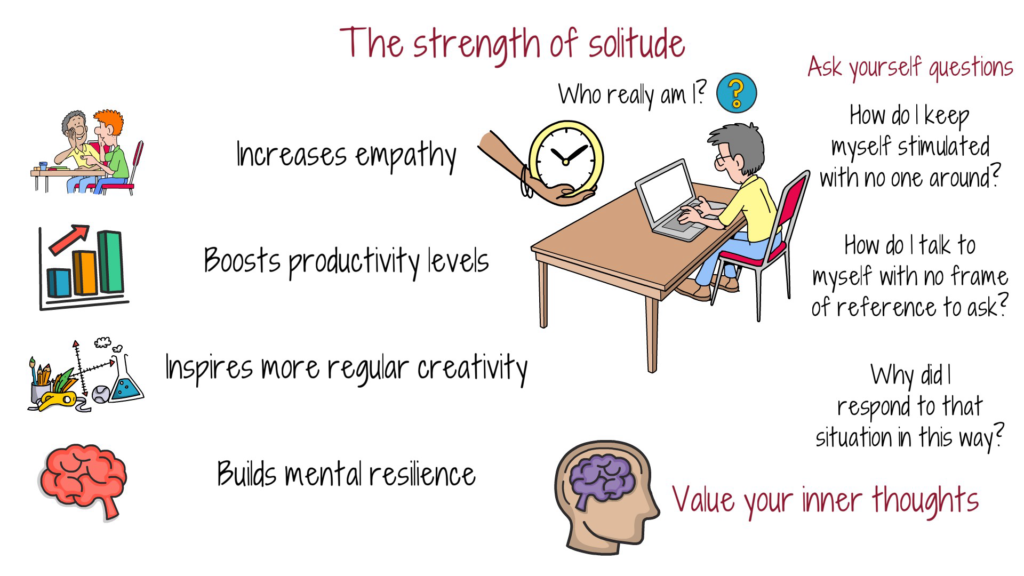
A big problem many people face is not enjoying or knowing what to do with their own company. Introverts are experts at this, as it’s what they rely on before and after intense social interactions. Incorporating simple habits like a daily walk can enhance mental clarity and provide a refreshing break during solitary time.
More to the point, spending more time alone provides an insight into who you really are – the person removed from any external presence. You can ask yourself questions like ‘How do I keep myself stimulated with no one around?‘, ‘How do I talk to myself with no frame of reference to ask?’, or ‘Why did I respond to that situation in this way?’. Essentially, an introvert-leaning person places significant value on inner thoughts. The more attention you pay, the stronger mind palace you can build.
After all, asking yourself questions in any kind of self-reflective manner is the most concrete next step you could possibly take.
Harnessing focus and concentration
Introverts are all about confidently spending time on their own. This leads to more focus and deep levels of concentration on tasks which aid toward improving their lives, whether that’s professional, social, or personal work.
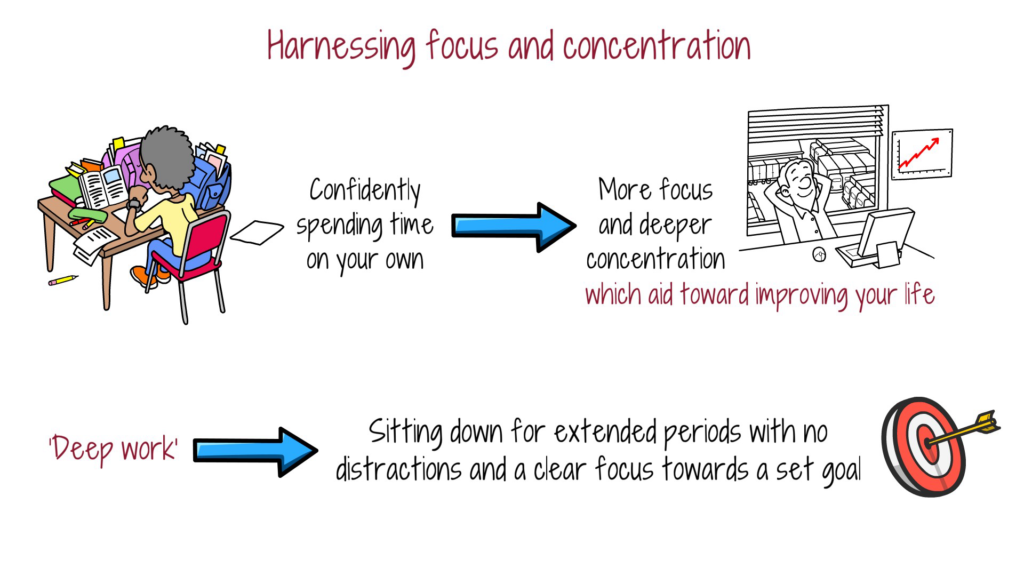
A productivity-based concept called ‘deep work’ embodies this sentiment, as it requires sitting down for extended periods with no distractions and a clear focus towards a set goal. When you’re more comfortable being alone than others, the circumstances deep work requires may come more naturally to introverts than anyone else. Practicing iron discipline is essential for maintaining deep concentration and achieving long-term goals.
Cal Newport, a psychologist who wrote the book Deep Work, touches on the benefits of an introvert’s tendencies:
“When I talk about my purposefully disconnected life, a common retort is that I’m missing out on the creative possibilities born of the frequent exposure to new people and ideas delivered through social media and related technologies. But here’s the thing, for the most part, this is not how high-level creative work is accomplished. It’s not, in other words, lack of input that stymies creative breakthroughs[…] What does stand in the way of creative breakthroughs — I’m increasingly convinced — is lack of time spent walking quietly with your thoughts, working and re-working your understanding of a concept in search of new layers of meaning.”
Put simply, making more breakthroughs (creative or otherwise) requires time, focus, and concentration on your thoughts.
Introversion as a self-improvement tool
Introversion has many helpful benefits, many of which will make self-improvement an altogether less daunting task. It places significant value on you and your thoughts, putting who you are at a core level in the spotlight. Of course, there are many benefits, but let’s recap just how introverts are set up for success when it comes to self-improvement:
- The power of reflection: self-assessment and reflection skills are a self-improver’s bread and butter. The ability to look back and figure out what you can do better should not be underestimated. Engaging with questions for self-assessment can be a powerful way to deepen self-understanding and foster growth.
- Deep listening and empathy: when you’re able to listen deeply and show natural empathy, forming relationships with yourself and others becomes easier.
- Strength of solitude: as introverts reading this will know, alone time provides the circumstances necessary for self-reflection. It teaches you to enjoy your own company.
- Harnessing focus and concentration: when you can easily settle down and focus, you’ve already started yourself off on the front foot.
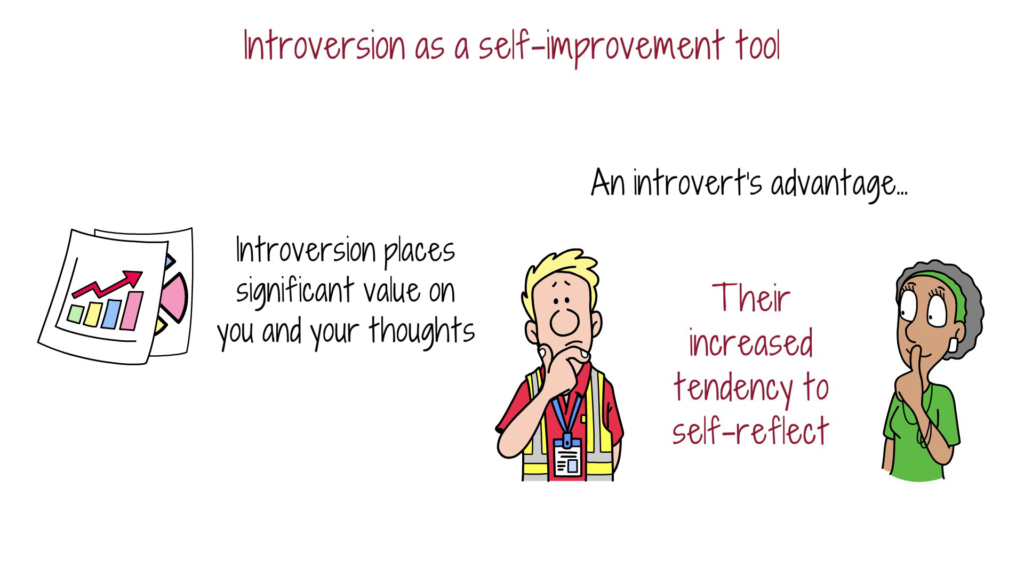
Essentially, an introvert’s advantage over everyone else is their increased tendency to self-reflect. Spending and enjoying your thoughts and company are the building blocks of your self-improvement journey.
